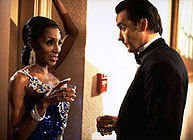|
|
|
|
Midnight
in the Garden of Good and Evil
|
 |
|
It is often said that contemporary filmmakers – not to mention their audiences – lack a decent sense of cinema history, its models and achievements. No current phenomenon bears this thesis out better than the courtroom thriller. How many movie patrons, as they struggle through the latest screen rendition of a John Grisham potboiler, remember or even know about the zenith of this genre, Otto Preminger's Anatomy of a Murder, made back in 1959? I did not expect such amnesia to ever infect Clint Eastwood, who has been, for over twenty-five years, one of America's finest filmmakers in the classical tradition. But his adaptation of John Berendt's novel Midnight in the Garden of Good and Evil, is perhaps his worst film – and it is a dreary psychological mystery-thriller by any standards. Screenwriter John Lee Hancock (who scripted Eastwood's marvellous A Perfect World [1993]) appears to have had problems deciding whether to turn Berendt's book into a crackling, Grisham-style expose, or a leisurely stroll through the culture and mores of Savannah. Eastwood tries his hand at both options (it is a long film) and fumbles them equally: the scenes involving investigation and a trial are like any old telemovie, while the cultural travelogue passages are unsubtle and laborious. Eastwood may love the music of Savannah's own Johnny Mercer, but his sympathies and interests seem not to penetrate into the heart of this true-life tale. Kelso (John Cusack) is a New York reporter assigned to observe the mysterious ways of socialite Jim (Kevin Spacey). On the eve of his departure, Kelso realises he has gotten hold of a far bigger story: Jim murders his younger, gay lover Billy (Jude Law), and claims self-defence. Kelso soon finds himself working on behalf of Jim and his lawyer, Sonny (Jack Thompson). Like Anatomy of a Murder, this is a story of psychological ambiguities that do not easily reveal their ultimate truth: finally, there are only appearances and facades, and the accounts that various individuals, for their own reasons, choose to tell or believe. The manners of Savannah society thicken this mystery: it is a place where everyone instantly knows everyone else's business, but this knowledge travels via strict rituals of secrecy, class allegiance and public disavowal. Like Preminger, Eastwood is a director who likes to observe his characters from an elegant distance – respecting (at least to some extent) their masquerades and canny strategies. Midnight in the Garden of Good and Evil should have been perfect material for Eastwood, tense and intriguing. But it turns bizarrely coy and evasive whenever it approaches anything that deviates from the heterosexual norm. And Eastwood's attempt to add a little Southern, voodoo spiritualism via the character of cackling Minerva (Irma P. Hall) is astonishingly creaky and corny. MORE Eastwood: Million Dollar Baby, Absolute Power, Unforgiven, The Bridges of Madison County, Space Cowboys, Blood Work, Pale Rider, Mystic River, The Mule © Adrian Martin March 1998 |
![]()